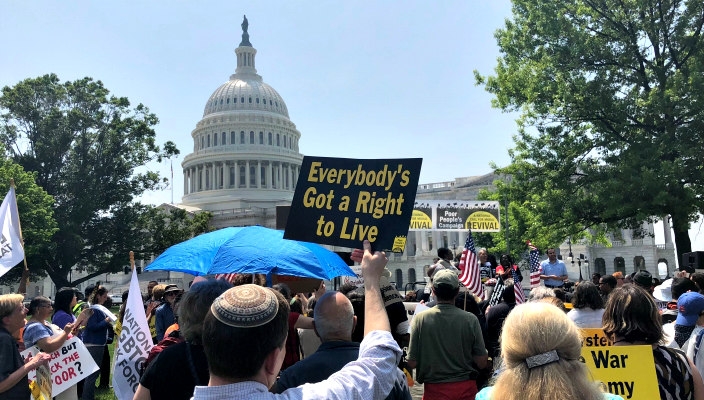EDITOR’S NOTE: As the Poor People’s Campaign proclaims, it is immoral and unjust that so many people in the U.S. — from Puerto Rico to Flint, Michigan — live without access to adequate food, water, shelter, and health care. We offer this Bible study as a reminder of how God stands on the side of the poor and oppressed, offering daily bread even when God’s people do not.
The kingdom of heaven has always had an anti-hoarding emphasis and a preference for wealth distribution. During the Israelite sojourn in the wilderness between Egypt and Canaan, God provided the Israelites with water from rocks, quail from the sea, and bread from heaven. Regarding the manna, the Israelites were charged with gathering as much as their families needed, an omer per person. We are told that they did, with “…some gathering more, some less” (Exodus 16:17).
After the gathering, when the amount of manna was measured, “those who gathered much had nothing over, and those who gathered little had no shortage; they gathered as much as each of them needed” (Exodus 16:18). Usually when this passage is discussed, emphasis is placed on the miracle that those who gathered little did not lack. I would like to address the situation of those who gathered much: they had no excess. This passage provides a key example of a bias in the kingdom of heaven against hoarding and vast accumulation of wealth.
The Israelites, when they complained during the wilderness journey, frequently looked back to their experience of food in Egypt. One wonders if the food situation they describe reflected their memory of slavery or of a time before the “new pharaoh” and their enslavement. In any case, the Israelites longed for the times of sitting by fleshpots, eating their fill of bread (Exodus 16:3) and free fish and assorted vegetables (Numbers 11:5). They looked back to a time of overabundance in which they could count on the security that came from having more food than they could consume. When the Israelites tried to keep manna for the next day and build up a surplus, it became foul and bred worms (Exodus 16:20). This prevented them from building up food security except for during the Sabbath (Exodus 16:22-26).
Looking forward to the other side of the wilderness experience, God warned that although the Israelites were being led into a land of super-abundance, that they must remember to bless the Lord for their food wealth:
For the Lord your God is bringing you into a good land… a land of wheat and barley, of vines and fig trees and pomegranates, a land of olive trees and honey, a land where you may eat bread without scarcity, where you will lack nothing… You shall eat your fill and bless the Lord your God for the good land that he has given you (Deuteronomy 8:7-10).
This land yielded produce so massive that a cluster of grapes had to be carried on poles between two men (Numbers 13:23). However, this plentitude was also dangerous for the Israelites reliance on God:
When you have eaten your fill… do not exalt yourself, forgetting the Lord your God, who brought you out of the land of Egypt… He made water flow for you from flint rock, and fed you in the wilderness with manna that your ancestors did not know, to humble you and to test you, and in the end to do you good. Do not say to yourself, “My power and the might of my own hand have gotten me this wealth.” (Deuteronomy 8:12-17).
The ability to acquire vast wealth beyond the provision of daily bread is antithetical to reliance on God. As with the temptation to return to Egypt, so the temptation in the land was toward abandoning the reliance on God as provider and to focus instead on the fecundity of the earth and human ability to plan and store food.
We see this principle reflected in the Lord’s Prayer for daily bread as well as the admonition not to store up treasures on earth (Matthew 6:19-21). Nowhere is the warning against storing up wealth clearer than in the parable of the foolish rich man (Luke 12:16-21). A man attempted to store up “ample goods for many years” but his imminent death ruined his plans. Instead of hoarding wealth for the difficult times Jesus foretold, the early church looked for opportunities to liquidate the excess of the rich for the provision of the poor (Acts 2:44-45, 4:32-35). Indeed, Paul specifically cited Exodus 16:18 in 2 Corinthians 8 as he tried to elicit funds for other believers.
As we consider Jesus, our bread of heaven (John 6), we are reminded that Paul frequently spoke of Jesus’ movement toward us in terms of wealth disbursement: “For you know the generous act of our Lord Jesus Christ, that though he was rich, yet for your sakes he became poor, so that by his poverty you might become rich” (2 Corinthians 8:9). Jesus was fundamentally anti-hoarding, even in his own exalted position. When we partake in the Eucharist and in the Christian life more generally, we receive, like those Israelites in the desert, exactly as much as we need, without possibility of hoarding. Instead we rely on daily provision. This is the way of the kingdom of God.

